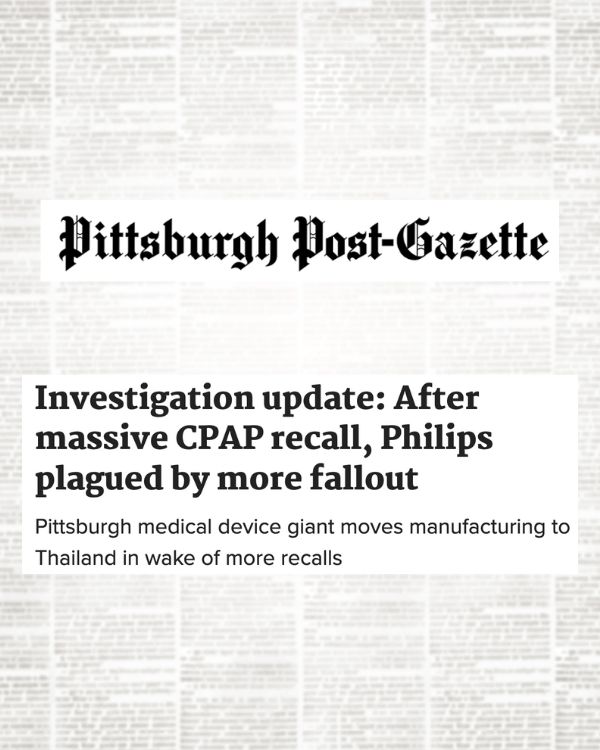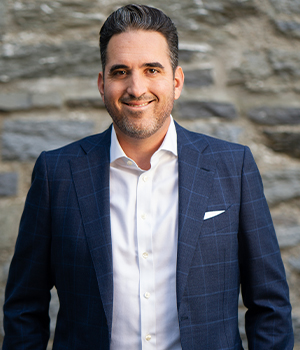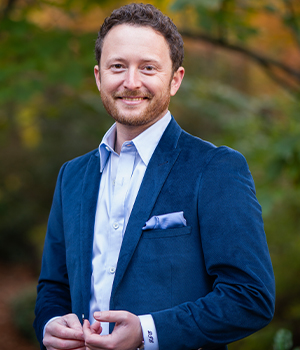
Investigation Update: After Massive CPAP Recall, Philips Plagues By More Fallout
Ben Baer is working with the Moore family, who tragically lost their daughter Julianna due to a failed ventilator. Read more about the case against Philips in the following article.

When Julianna Moore wanted to start her day, she knew just how to wake up her parents: curling her toes.
Diagnosed with cerebral palsy at birth, the 5-year-old slept with a device attached to her feet that measured her heart beat, and by squeezing her toes, the machine’s alarm would trigger and roust her parents.
That’s why, on Thanksgiving morning three years ago, when the fa
miliar beep of the device awoke Billy Moore and he noticed that his daughter was laying still, he didn’t panic. He pulled up her blanket to look at her feet.
But this time, “her toes weren’t curled up,” he recalled.
His eyes darted from his daughter’s chest — motionless — to the Philips ventilator that helped her breathe at night, back to her chest.
All signs of life were gone.
Days later, the young girl’s death certificate arrived with the cause: “respiratory arrest due to failure of home ventilator machine.”
The family of Julianna Moore is waging a legal battle against Philips after the 5-year-old girl died three years ago while using a Trilogy EVO ventilator, which was ultimately recalled after it was discovered that debris could accumulate in the chamber and cut off the air supply to the patient.
“She had a lot more life in her,” Mr. Moore said. “And for something like that to just cut it short — that’s very upsetting.”
Years after the massive recall of the company’s CPAPs and ventilators, Philips took steps last year to remove yet another medical device from the market — the Trilogy Evo — the same machine that Julianna Moore was using when she died in her Texas home.
The removal of her ventilator is one of several recalls the company has launched after initiating the much larger one in a striking series of failures that have plagued Philips as it ends manufacturing in the Pittsburgh area and moves its operations to Thailand.
Two years ago, the company pulled its V60 ventilators from the market after patients discovered the alarm was not working when the air flow stopped, leading to at least four reports of deaths to the FDA and about 33 injuries.
An earlier version of the Trilogy EVO was recalled in 2021 after it was found that hundreds of the machines were stuffed with the same hazardous foam that was used in the defective CPAPs.
The ventilator used by Julianna Moore when she died is one of more than 70,000 the company pulled from the shelves in 2023 after being targeted with hundreds of complaints about dirt and dust collecting in the machines and at times blocking the critical flow of air to patients.
So far, the FDA has received at least four death cases tied to the machines since 2021 and more than two dozen severe injuries, according to an analysis of the agency’s data.
“We relied on this product to help her — and unfortunately, it didn’t and ended up failing,” said Mr. Moore.
The recalls come as Philips continues to transfer workers from its Bakery Square offices — about 500 in all — to its massive facilities in Murrysville and New Kensington, where the company once dominated the nation’s sleep apnea industry.
Now banned by federal regulators from selling breathing devices in the United States until certain safety conditions are met, Philips is slashing 300 manufacturing jobs that were once tied to those centers.
Deaths and injuries
In the next year, the making of Philips breathing devices will shift to a company in Thailand, Kimball Electronics, as it embarks on a new chapter after churning out millions of the machines for years from its Pittsburgh plants.
As Philips tries to salvage its business and recapture its once formidable place in the medical device industry, it continues to face scrutiny over the safety of its products — which were sold to veterans and the U.S. military during the pandemic — and its ability to respond to complaints of deaths and injuries.
Since 2021, the Food and Drug Administration has received more than 560 reports of deaths associated with the devices, and the Post-Gazette has found at least 5,500 cases of cancer reported to the agency.
After an FDA inquiry, the company reached an agreement with the government this year and said it would submit to increased inspections, a ban on sales, and other conditions in the wake of hundreds of death and illness reports tied to the devices.
Though the company agreed to turn over $1 billion to settle injury lawsuits involving the CPAPs and ventilators, patients continue to file claims over the Trilogy EVOs, which were hit with thousands of internal complaints from patients and others.
In email responses, Philips said that deaths reported to the FDA are not verified and that the company and its outside experts have found the foam used in the CPAPs has undergone extensive additional testing and the material “is not expected to result in appreciable harm to health in patients.”
The company said that “patient safety and quality are Philips’ highest priorities.”
However, internal records obtained by the Post-Gazette and ProPublica in an investigation last year shows that the material used in the machines routinely tests positive for genotoxicity — meaning it causes cells to mutate, which can lead to cancer.
“No one should be using those machines,” said a safety engineer who was familiar with the testing.
Philips continues to face other ongoing battles, including a federal criminal probe into allegations that it failed for years to respond to serious warnings that the foam placed in its CPAPs and ventilators was breaking down into tiny pieces and releasing hazardous chemicals into the mouths and lungs of patients.
A Post-Gazette investigation in September found that a whistleblower complaint in federal court in Pennsylvania prompted an FBI inquiry into the millions of dollars paid by federal agencies — including the Department of Veterans Affairs — to buy the devices with the bad foam.
Despite warnings from its own safety experts in 2020, many of those same machines were sold by the company during the pandemic — with the nation in short supply of ventilators — reaping millions in operating profits, records show.
“Some of my colleagues say they’ll never use Philips products again, because why would they put their patients at risk?” said Kin Yuen, a sleep medicine physician who serves on the clinical faculty at the University of California San Francisco.
End of an era
For the past three years, many of the workers in the Pittsburgh region were mobilized to send out the replacement CPAPs to patients who were told those machines would be safer.
But even that process has fallen under criticism after it was discovered the new foam being stuffed in the devices had also failed safety tests three years ago and was found to be emitting dangerous chemicals. including formaldehyde, a compound found in fertilizers and glues.
The company also discovered that some of the replacement machines had to be recalled after it was discovered the foam could separate inside the devices and cut off the air flow.
While Philips says the new foam is safe, the FDA has insisted the company continue to test the material to see “if the foam in the repaired devices does in fact present any risks to patients,” the agency wrote in an email to the Post-Gazette.
Though the Philips breathing machines will now be made in Thailand, the company will still be subject to the terms of its agreement with the FDA and any movement of the machines to the U.S. would have to meet the agency’s safety thresholds.
“All establishments manufacturing such devices, whether foreign or domestic, are subject to FDA inspection,” the agency said in an email to the Post-Gazette.
While Kimball touted the “growth potential” of becoming Philips’ “sole supplier” of its respiratory care business, the move ends generations of the CPAPS being made in the Pittsburgh area.
Philips continues to transfer workers from its Bakery Square offices — about 500 in all — to its massive facilities in Murrysville and New Kensington, seen above.
The tradition started with the company, Respironics, which created the first mass-produced CPAP in the nation in 1985 and went on to employ more than 4,800 people before the company was sold to Philips under threat of a hostile takeover in 2008.
When Philips said in June it would stop making the machines in Pittsburgh, the decision dealt a blow to local economic development leaders, who say the company was once the seventh largest employer in the region. But since then, those communities say they’ve heard very little about the transition.
“The company has not been responsive to multiple queries from our economic development team,” Westmoreland County Commissioner Ted Kopas said.
The state has been slightly more involved. Touting a “long-standing, cooperative relationship” with Philips, the Department of Labor told the Post-Gazette it has hosted a series of “Rapid Response” meetings and jobs fairs for employees who have been impacted in recent years.
Before its most recent series of problems, Philips faced disciplinary matters with the FDA that halted sales of thousands of defibrillators from 2017 to 2020.
After scrutiny of its imaging division in Cleveland, however, the company moved manufacturing of those devices overseas to Israel and China. The FDA has continued to monitor the safety of those devices.
The company’s move to Thailand comes at the end of one of the most tumultuous periods in its history when it was constantly under criticism over its safety practices — a sharp contrast to the company that it purchased in 2008.
Respironics had established itself as one of the leading CPAP makers in the world with a known history of working with the FDA and responding to customer complaints, records and interviews show.
The years before the company was sold, Forbes magazine took into account the device maker’s regulatory history and financial practices and named it one of “America’s Most Trustworthy Companies.”
For founder Gerald McGinnis, a celebrated biomedical engineer who died earlier this year, the turn of events — including the recall — was devastating, even though it wasn’t his company anymore, said his wife, Audrey.
“People’s jobs were lost and lives were lost,” she told the Post-Gazette. “There are no words to describe it.”
Respironics founder Gerald McGinnis, who died earlier this year, created the first mass-produced CPAP in the nation in 1985 and was board chairman when the company was sold to Philips under threat of a hostile takeover in 2008.
Dr. Rita Redberg, a cardiologist and expert on medical device safety, said the company’s multiple recalls in just a few years represents “a dangerous pattern of ignoring safety concerns and a systemic failure of quality control and prioritizing patient safety.”
If the company continues to sell devices in the US, the FDA needs to monitor its safety practices, she said. “The FDA should be watching closely any company making devices for use in America,” she said.
Painful questions
Heather Moore said she and her family are still seeking answers about the machine that her daughter was using before she died in 2021 — a device that was supposed to perform more efficiently in delivering air.
The night before Julianna died, her parents told her about the Thanksgiving foods she would taste the next day: sweet potatoes, turkey, a pineapple upside down cake already in the oven.
The little girl kicked her feet up in the air as she got ready for bed — something she did when she was excited, Ms. Moore recalled.
“She was happy,” Ms. Moore said. “She went to sleep happy, and we checked on her. She was fine.”
After she passed, Heather and Billy Moore said they were left with the same wrenching questions about what went wrong with their child, who they adopted at age 3.
“We wanted to know, for closure for ourselves, just kind of what exactly happened,” Ms. Moore said. “What could she have gone through?”
After carrying out their own research, the couple hired Pittsburgh attorney Ben Baer who filed a lawsuit last year against the company in Allegheny County Common Pleas Court.
Their suit seeks damages on six counts, alleging the company is liable for Julianna’s death because they made and sold a defective ventilator. The company, in turn, has denied the allegations in a court filing.
In the interim, the family hopes the case will bring them closer to understanding what went wrong.
“We don’t want other families to go through what we’ve been through,” Ms. Moore said.
“It’s so difficult just knowing that we would still have her with us and knowing that we had more time — that time just being taken away from you is really hard.”







